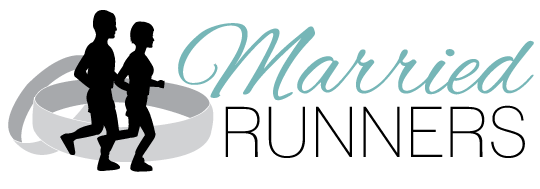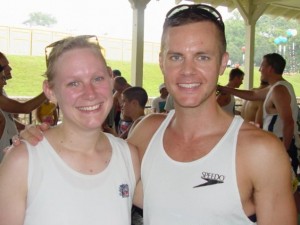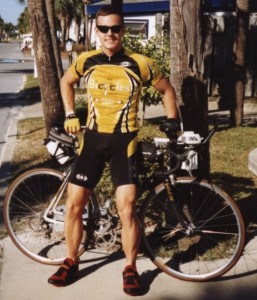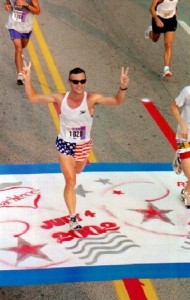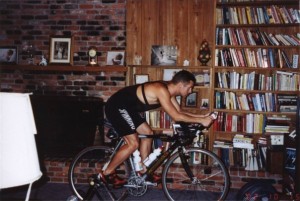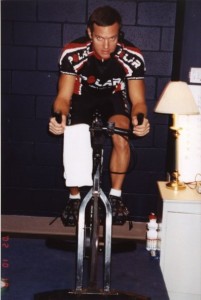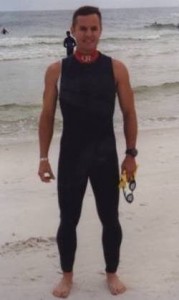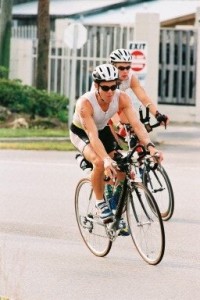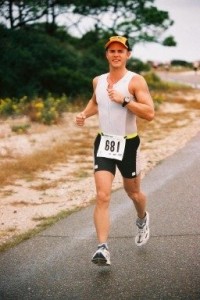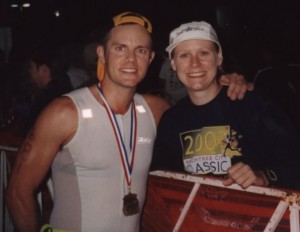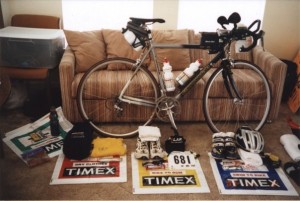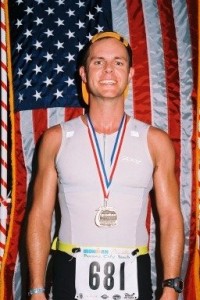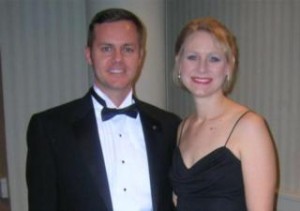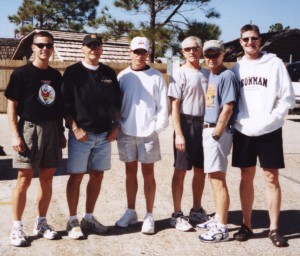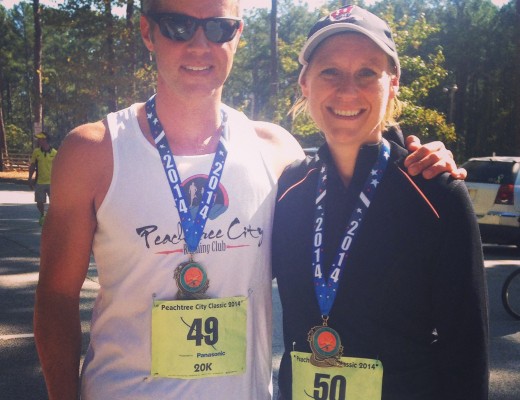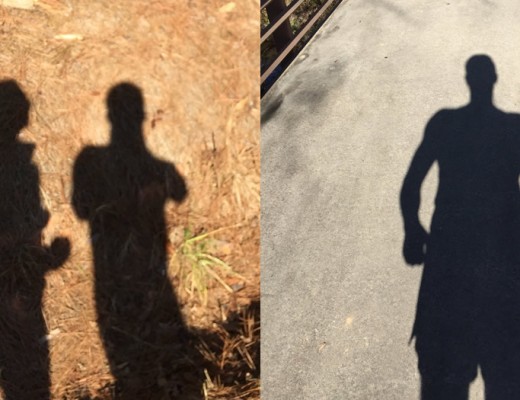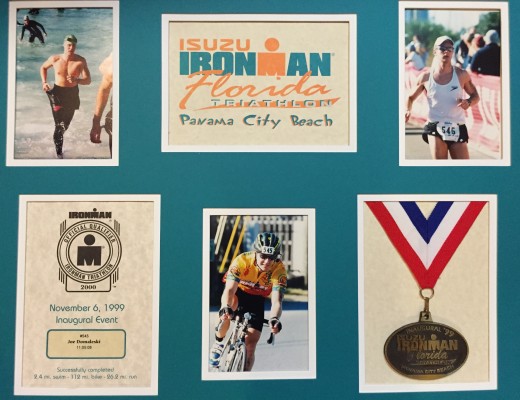Why I Stopped Competing in Triathlons
In 2003 at the peak of my athletic ability, I abruptly stopped competing in triathlons. Over the years I’ve been asked about it and have always deflected the question. It’s taken a lot of courage to come clean and share my story, which has never been discussed with anyone except Mary Catherine. Please understand from the outset that I’m not trying to convince anyone to stop competing in triathlons or other time-demanding activities. My purpose is to share my own story in the hopes that it may give voice to other people struggling with life balance.
What I share here may touch some nerves, so let me reiterate that it’s not my intention to tell you not to compete in triathlons. There are plenty of people including some dear friends of mine who can and do successfully manage family, work, and athletic pursuits. I still love the sport and hope to compete again.
This article is the second in a series (you can read the first article here) we’ll be doing about finding life balance when one or more partners spends a lot of time in the pursuit of athletic / fitness goals. This is our story and we’re sharing it in the interest of helping other couples.
We know that every marriage/relationship is unique, so how we deal with situations may be radically different than how you do. What works for us may not work for you. We also know that in talking to many couples and “Ironman widows/widowers” that there’s oftentimes an unspoken resentment or frustration that deserves a voice.
Although the subject of this article concerns triathlons, the overall topic of finding life balance can apply to a whole host of other life pursuits.
In this article and the ones that follow, we’ll share that what works for us is to communicate, compromise, and commit.
Background
When Mary Catherine and I got married on September 17, 1994 we were both overweight – neither of us were runners, triathletes, or did any kind of deliberate exercise. My idea of exercise was my annual July 4th walk down Peachtree St. for the Peachtree Road Race 10K. I had been a mediocre runner in high school (too scrawny to do any other sport), did PT (physical training) in the Army but by no means was an athlete. We’ll save the full story for another article, but suffice it here to say that I decided to get in shape a few years into our marriage. It was a slow progression from walking, to running, to fast running, and that eventually led to the sport of triathlon.
For those first few years, Mary Catherine was cautiously supportive as she followed along on my various runs and races. I did have an early flirtation with triathlon when I competed in the now-defunct Lake Lanier triathlon as a Clydesdale in 1995! At a weight of 205 (I weigh 165 now), I was the winner (and only competitor) in the Clydesdale division.
Other than that, I was a runner for the most part during the early years. As my 5K and 10K times got faster, I started to train for and run in marathons. It’s important to point out a change of motivation. Up until I qualified for Boston, my main goal had been fitness and overall health, with a secondary goal of getting faster.
Qualifying for and running in the 1998 Boston Marathon was a defining moment for me personally, because it marks the moment when I really became “serious” about endurance sports. Running was my first sporting love, but once I had run the Boston Marathon I figured there must be a bigger challenge out there – the Ironman Triathlon! My motivation changed from fitness and health to competition.
Becoming a Triathlete
During the late 90’s I spent a lot of my extra time at a local YMCA. It was there that I plugged into master’s swimming, Spinning classes, and made ample use of the nearby hills of Chattahoochee Plantation to become a serious triathlete. I forged some lifelong friendships which still endure from that time of my life. A steady diet of miles (on the road, at the YMCA, and at home), progressive triathlons, encouragement from friends, and support from the local community lead to the train-up and completion of my first Ironman. During the Inaugural 1999 Ironman Florida on November 6, 1999 I had a very respectable Ironman debut time of 11:05, well ahead of my sub-12 hour finish goal.
In hindsight I realize I had “sold” that race to Mary Catherine as the culmination of all my training, with the suggestion I would scale back my training activities. At this point in our lives we had two small children (who were dragged around to the races) and I had a growing consulting career. My life was pretty much sleep, train, work, repeat – with little time for family. Unfortunately, I was selfish and made the opposite decision and decided to increase my training! Figuring I had potential to qualify for the prestigious Ironman Hawaii Championship, I began to plot how I could score an age-group entry.
Adding fuel to the Ironman fire were several other activities and interests. I decided to become a Spinning instructor and share my passion with others. Mary Catherine also decided to get certified and I rationalized her interest as further support that I was doing the right thing. I got “noticed” and became a national training instructor for another indoor cycling program, where it was my honor to teach/train/certify other instructors.
In 1999 I was runner-up for Atlanta athlete of the year based on athletic performance and community involvement. I also received a Volunteer of the Year Award from the YMCA for my involvement in their charitable giving programs. These honors served to further validate the choices I was making to pour myself into the sport.
During the time frame of 1999-2003 I logged my fastest times and PR’s, which still hold today. In 2002 I got certified as a USA Triathlon Coach and contemplated starting a coaching business. A dear friend of mine approached me about starting a race and triathlon club in Peachtree City, which endures today as Tri-PTC. I’m still honored at having been a founding director of that fine organization. Life was good, or so I thought.
Peaking Out at 2002 Ironman Florida
The peak of my involvement in triathlon as an athlete was competing in the 2002 Ironman Florida. I had very high expectations for my performance in that race. At the time I was a sub-3 hour marathoner and could complete a century (100 mile) bike ride in 4 hours. Although I wasn’t a great swimmer, I had been swimming with the very competitive Dynamo master’s program and had made good improvements. A low 10-hour time was good enough in those days to qualify for Hawaii in my age group. On paper, it appeared I could do it.
Races rarely go exactly how you expect, especially long races. During Ironman Florida 2002 storms rolled in the weekend of the race and churned the ocean. I had a very poor 2.4 mile swim but attacked the bike portion with vigor. Despite the squalls that were blowing through, I logged a very respectable 5:14 for the 112 mile bike portion. My run started according to plan, but blisters made the second half agonizing. I walked my way to a 4:07 marathon for an overall finish in an overall disappointing time of 10:52.
Here’s the complete break-down of the numbers on my 2002 Ironman Florida:
- Swim 2.4 miles- 1:21:28
- T1 (swim-to-bike) – 4:44
- Bike 112 miles – 5:14:49 (21.35 mph)
- T2 (bike-to-run) – 3:35
- Run 26.2 miles – 4:07:25
- TOTAL: 10:52:01 (89th age group, 326th of 1,773 overall)
Many people would be ecstatic with a time like that, but I knew I was capable of much more. Not only was my time no where near Hawaii standards, but word had gotten out about the “fast” Ironman Florida course. As a result, some pro’s raced as age groupers so the time standards were frankly out of reach even if I had a perfect race.
I had spent all that time, money, and energy for what? What about my family? At this point Stephen was born so we had three young children.
Quiet Withdrawal from the Sport
I need to make something very clear – Mary Catherine never argued with me about all the time I was spending on triathlon. We never fought about it. She never even really expressed concerns, but I could see the toll it was taking. Sometimes silence is louder than words. I came to the realization that what I was doing just wasn’t sustainable or fair to the family. Ironically, just as I started to slowly fade away from the sport our local triathlon community was ramping up with our new Tri-PTC sprint triathlon race and new Tri-PTC triathlon club in Peachtree City, GA.
Peer pressure can be strong, even if it’s unintentional. I even signed up for two more Ironman races, but never showed up (yes, that was a waste of money)! As a couple, we continued to support the local triathlon community and participated in running events (by now Mary Catherine was a fitness trainer and runner), but I share the truth now – I made a quiet withdrawal from the sport beginning in 2003 for reasons I’ll share below.
Reasons I Stopped Competing in Triathlons
Obsession – let’s face it, triathlon (and many other endurance sports) are solitary and can be selfish activities. My personality type is such that I don’t like to do anything halfway. I’m either all-in or I’m not. If you combine my personality type with a sport that tends to attract driven, competitive people then you have all the makings of an obsession. Yes, I was obsessed with the sport back then. If the object of my obsession had been another woman and not a sport, then it would have all the outward appearances of an affair. Many Ironman widows/widowers feel abandoned. I could not in good conscience continue to make Mary Catherine and my children secondary to swimming, biking, and running.
Time – the time commitment to properly train for a triathlon, especially an Ironman triathlon, is enormous. Although I’ve heard of some people who can get by on as little as 12 hours a week, it really takes 20+ hours a week of training which is like having a part-time job. Done early enough in the morning, the daily training isn’t as disruptive to the family. Every weekend being spent with long hours on the bike and/or on a run just wasn’t fair to the family. When the kids were younger, I could get away with long hours invested in training. As they get older, I may have the time again. But back in 2003, my oldest child was starting to play sports with weekend games & tournaments and it just wasn’t do-able.
Money – the sport of triathlon is not cheap. Back in 2003 equipment and race costs were high and 12 years later it’s even more expensive. Some critics maintain that triathlon has become a rich person’s sport. I’ll leave that up for you to decide. We live in a country where, for the most part, we’re free to spend our money how we please – cars, boats, vacations, fine dining, triathlon bikes, etc. Right now as I write this article I need a car for my daughter and I’d love to have a new bike – both cost about the same! Given our family income and expenses, staying active in the sport was quickly becoming unaffordable. My daughter once asked me if every family vacation had to involve a race? Good question.
Fatigue / Health – During the 2002 Ironman pre-race dinner, a medical doctor made the wise observation that we were all the sickest fit people in the world. By “sickest” he didn’t mean “cool” or “impressive”. It’s true that the long-term effects of ultra-endurance sports have yet to be properly studied. Each of us is different in terms of body composition, susceptibility to illness, and overall health. Using myself as an example, I always got sick after a marathon or half/full Ironman. Due to the heavy toll of training, I was always tired. Is that healthy? Perhaps I wan’t training or eating properly? Train, work, sleep, repeat just wasn’t sustainable for me from a health perspective.
Why Am I Doing This? – I don’t have a good answer to this question, but the more I trained and raced the more I began to ask myself “why am I doing this and spending so much time on triathlons”? Why spend all of my waking hours swimming, biking, and running? Why do I want to race and win awards? Why do I want to impress myself and friends with fast times? Why am I embarrassed when I have a bad race? Why do I subject myself, my family, and my pocketbook to all of this? I never found a good answer to “why” – despite long hours on the bike and running while contemplating it.
A Few More Comments
Here’s a few more comments to put my story in context. The divorce rate among Ironman triathletes is high. Lest you think I’m being judgmental, I’m not. I was married once before and know the pain of divorce first-hand (although my divorce was unrelated to triathlon). Ironically, during the 2002 Ironman there was a fellow triathlete and PhD candidate doing a survey about divorce and triathlons. I don’t think competing in an Ironman causes divorce, but it sure puts pressure on a relationship that can make matters worse. Every divorce is unique.
I have many friends that make it all work (family, work, triathlon) – some of you are reading this article. You are amazing and I’m honest enough to admit that I’m a bit jealous of your ability to juggle it all. As a middle-aged husband, father, and runner I’ve accumulated enough gray hairs and life experience to know that every family situation is different. What works for one family might not work for another. Every situation is unique.
A few weeks ago I was talking to a fellow Ironman about some of the things I intended to share in this article. He correctly noted, “How can you blame triathlon, it’s just a sport?” Very true and point well taken. It’s not the sport that’s at fault. You could substitute any number of activities and pursuits – golf, travel, drinking, etc that might disrupt your family life. You only have one life, choose how you spend it wisely.
Summary
If you’ve made it this far into the article, you are to be commended! Thank you for reading this article which was very therapeutic for me to write. Some of you may be nodding your head in at least partial agreement. Others may be shaking your head in disagreement. Again, every life situation is unique. I love the sport of triathlon and hope to make a return to it some day. Lest you think I’m down on the sport – I’m not. Every year since my quiet withdrawal I have continued to help out as a volunteer at our two local triathlons. I’ve kept my membership active in the club and join it for training events from time-to-time.
Mary Catherine and I have quite a bucket list of activities planned once the kids are grown. Right now, our fitness pursuits are more reasonable for us and where we are at in life. One of the things we’re really enjoying is running together and sharing about it in this blog.
So now you know why I stopped competing in triathlons. How about you and your family? We’re interested in helping strengthen mind, spirit, body, and family. In the next article, we’re going to share some suggestions on how to manage things when you have an unsupportive spouse. We’ll present those ideas from both perspectives – that of the athlete and that of the athlete widow/widower.
Dedication – I’d like to dedicate this article to the loving memory of a dear friend, Bill McBride (7/10/1940-8/3/2008). Bill was a phenomenal athlete, family man, supporter of the local community, and also instrumental in helping us establish the Tri-PTC sprint triathlon race and club. Where I had failed to accomplish my Ironman goal in 2002, he successfully accomplished his. Bill McBride competed in the same 2002 Ironman Florida race in a smoking fast time of 12:02. He placed second in the male 60-64 age group, qualifying him for the prestigious Ironman Hawaii Championship for 2003. He completed the Ironman Hawaii in 2003 with many friends in attendance. He was diagnosed with cancer the following year in 2004. Bill continued to stay very active right up until the end.
